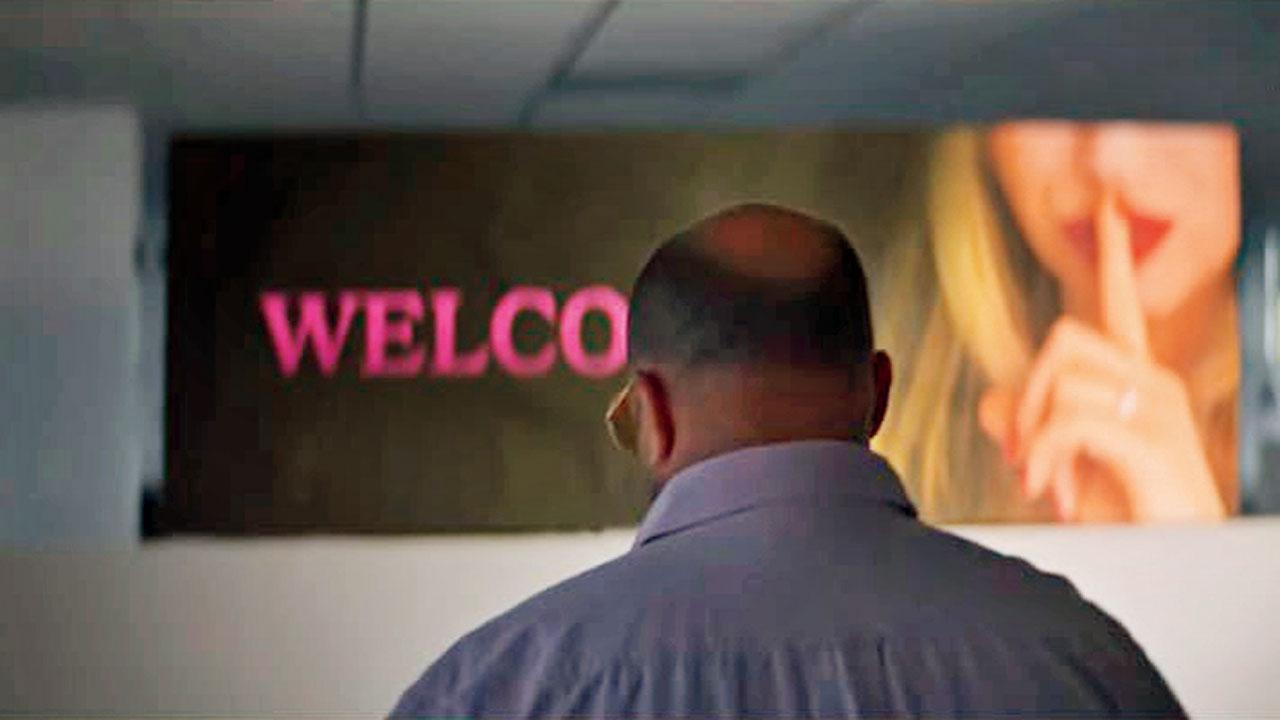Dating apps have truly revolutionised relationships. Can’t believe they somewhat started with Ashley Madison!

A still from the Netflix documentary series Ashley Madison: Sex, Lies & Scandal
 All men, negligible exceptions apart, are closeted singles. Especially, married men. Also, couples that stay together, stray separately, inevitably, at some point.
All men, negligible exceptions apart, are closeted singles. Especially, married men. Also, couples that stay together, stray separately, inevitably, at some point.
Am I saying this, observing goon-faced, “committed” males scrolling thirst-traps, non-stop, on Instagram? No, that doesn’t even count as cheating!
Am I being harsh to marriage as an institution—that forms family, the primary building block of a society, after all? Nope.
I’m simply responding to the new Netflix documentary series, Ashley Madison: Sex, Lies & Scandal, empathetically directed by Toby Paton. What is/was Ashley Madison?
A dating app, before there were dating apps! A website, basically. What did it do? Discreetly hook up married men and women, seeking nothing but a secret affair, without affecting their married lives, in any way.
Why did it become such a big deal in 2015? Because all that data got hacked, leaving to hang dry, in the open, all the men, who had signed up.
Guessing, also women—but somehow the doc, as with news reports of the time, don’t focus so much on female participants in these parallel lives.
This could also be because the men were disproportionately more than women on the site. Many of the guys were, in fact, chatting up bots for a booty call.
Because the owners of this Toronto-based firm, primarily its founder-CEO, Noel Biderman, had planted fake, female IDs, to net men into spending $100 million a year on Ashley Madison (named after two common female names).
The site’s tagline was: Life is short, have an affair! Essentially equating monogamy to monotony. Who shut this shit down? Motives are still unknown.
It could be an offended religious group, for all we know. An easy guess is this was an inside job—hell hath no fury like a disgruntled employee, clearly.
What this episode revealed, according to the director, Paton, quoted in the show’s publicity material: “We all know infidelity can be incredibly destructive and hurtful, but at the same time, the fact that Ashley Madison had 37 million members tells us something else we all know—that committing to one person for the rest of your life is really hard.”
Now, I’m not married. Never been. But there’s something I understand about sites like Ashley Madison that, thankfully, the lead character of the series, Sam, mentions in passing.
I’m calling him the lead character here, because he’s part of a YouTube influencer couple, Sam & Nia, who document their married life for clicks online. Sam claims he got into Ashley Madison, before he once posted a video with his wife.
That video went viral. He found no reason to seek public validation thereafter, from ladies on Ashley Madison. Validation being the point of most people on dating apps, anyway—whether they realise this or not. Many of them don’t even wanna get into a relationship.
The thing with Sam & Neil, though, is—they claim to be good Christians, protecting family values; hence, their online following. This Sam fellow being on the supposedly amoral Ashley Madison is a grander betrayal of trust to his audience than his own wife!
‘Thou shalt not commit adultery’ is one of the 10 commandments. Although, as a former Ashley Madison employee says in the series—there are 613 commandments (in the Jewish tradition); “one of them is ‘thou shalt not eat shrimps!’”
Either way, you can only fall from a moral high ground. No such issue with another couple in the series, where the wife was honest/open to her husband about experimenting with other men—keeping their emotional intimacy intact still because, evidently, in their case, there was more to marriage than sex (or lack thereof).
These are conversations that people don’t like having in public. It’s considered obscene—a word that probably comes from ‘off the scene’, or what must not be seen.
Here’s what I learnt from Paton’s series, in the sense of fact—that there are several countries, including Philippines, where divorce is illegal.
My relearning from the doc was that Ashley Madison—exclusively designed for married people to cheat—pre-dates Tinder, by 12 years! It’s quite astounding, if you see it somewhat as a first move for what became a more legit dating-app sub-culture.
What did dating apps do? IMO, redefined relationships. We can obviously debate this. What’s undeniable is how these apps first (or at least around 2016) had a stigma attached to them.
Especially if you were a woman. That you’d meet a man this way, apparently, said something about you. If you’re a guy—clearly you got no game, let alone score, IRL, to graze online. So not the case anymore.
Initially, only few saw these apps as hardly different from two people meeting at a bar or house-party. Also, hugely liberating, by way of choices beyond closed social circles—a reason people have forever complained that it’s harder to make new friends as you get older. Probably not true.
A newer phenomenon with dating apps—whether hook-up (Pure), relationship (Hinge), or both (Bumble)—is the number of people you find “married”, seeking “something casual”, “NSA” (no strings, as in no emotions, attached), being “ENM” (ethically non-monogamous). And I’m talking of women, of course.
I wonder if Ashley Madison data leak would be as big a deal in 2025 as it was in 2015. Don’t know. That site is still around, by the way!
Mayank Shekhar attempts to make sense of mass culture. He tweets @mayankw14
Send your feedback to mailbag@mid-day.com
The views expressed in this column are the individual’s and don’t represent those of the paper.
 Subscribe today by clicking the link and stay updated with the latest news!" Click here!
Subscribe today by clicking the link and stay updated with the latest news!" Click here!










